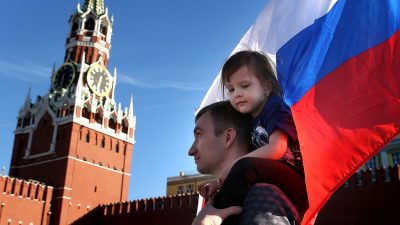Demographic Crisis: Russia to Facilitate the Granting of Russian Citizenship to Ukrainians

President Putin’s proposal to make it easier for all Ukrainians to receive Russian citizenship represents a bold effort to court his country’s civilizationally similar neighbors as “replacement migrants” and will lead to a competition with Russia’s historical rival Poland for this valuable “human resource”.
Population Trends
It’s no secret that Russia has had serious problems maintaining its population levels ever since the collapse of the Soviet Union, and last year actually saw its first drop in a decade. This process is occurring concurrently with a surge in birthrates among the country’s Muslim minority and leading to the likelihood that approximately one-third of its inhabitants will follow Islam within the next 15 years, according to Russia’s grand mufti.
Moscow is well aware of the socio-political challenges that this profound demographic shift might entail, especially if its controversial Article 282 proves insufficient for preemptively dealing with the dangerous rise of far-right ultra-nationalist ideas that might eventually inspire Christchurch-like terrorist attacks that seek to provoke a destabilizing so-called “Clash of Civilizations” within its borders. No matter how visionary President Putin’s 2012 manifesto on ethnicity and immigration is, it’s impossible for it to be perfectly applied in practice so it should therefore be taken for granted that some security incidents will eventually happen.
Trouble Looming?
The UN predicted last year that Russia’s population will shrink by 11 million before 2050, which is one of the reasons why Prime Minister Medvedev warned earlier this month about the need to prevent a demographic collapse similar to the one that happened in the 1990s. The other implied one might also have to do with the fact that this expected population loss that will presumably be led by the country’s ageing titular nationality of Orthodox Russian Slavs will result in an even larger percentage of its citizens being Muslim by that point, which could possibly accentuate the socio-political challenges that are usually associated with this sort of demographic transition in majority-Christian countries. Although President Putin implemented a policy to give generous subsidies to women who give birth to two or more children, he probably realizes that it won’t be as successful as needed to maintain both the country’s population levels and its existing religious balance, hence why he’s now proactively trying to court Ukrainians as “replacement migrants”.
“Civilizationally Similar Replacement Migrants”
These neighboring people are “civilizationally similar” to Russians in that they’re mostly Orthodox Slavs who speak a related language, and their possible large-scale migration to the country could theoretically balance the surging birthrates of Russia’s Muslim population and offset its predicted overall population decline. This was probably one of the reasons why President Putin just passed a decree making it much easier for the people of Donbass to obtain Russian citizenship and then soon thereafter declared that this policy might be extended to include all of Ukraine’s over 40 million people. There were slightly less than 2 million Ukrainians living in Russia nearly a decade ago as recorded by the country’s census at the time, which is roughly equal to how many have moved to Poland since the 2014 EuroMaidan coup in search of work, where most of them presently have no path to citizenship and many are now reportedly considering moving to Germany or other Western European countries.
Poland vs. Russia
Nevertheless, Poland’s population is also afflicted with similar problems as Russia’s own in the sense that it also suffers from the natural decline that many developed economies do, so Ukrainians could conceivably also function as “civilizationally similar” “replacement migrants” for Warsaw just as they could for Moscow, meaning that these two historic rivals might end up competing with one another for this valuable “human resource”. Unlike in times past, this competition won’t be waged by military means and take place in the geopolitical realm, but will be a battle of soft power with an outcome that will ultimately be determined by which of the two countries provides more appealing economic prospects for the “new arrivals”. While Russia has the geographically expansive Moscow-led Eurasian Economic Union, Poland has the promising Warsaw-led “Three Seas Initiative” that comes with the added benefit of EU membership.
Concluding Thoughts
It’s difficult to predict whether the Ukrainians that are living in Poland would relocate to Russia in response to President Putin’s citizenship proposal or if a new batch of their countrymen that are still living in their homeland will move there instead, but what’s clear is that Moscow is now competing with Warsaw to woo Ukrainians as “civilizationally similar” “replacement migrants” to offset its natural population decline and maintain its existing religious balance that’s poised to dramatically change in the coming years following a surge in Muslim birthrates. Unlike Merkel and her implicit policy of “replacement migration” from the “Global South”, President Putin would prefer to court Ukrainians from the former Soviet Union, but in both cases each leader seems to have resigned themselves to the fact that their country’s demographic problems won’t be solved without a large-scale influx of immigrants.
*
Note to readers: please click the share buttons below. Forward this article to your email lists. Crosspost on your blog site, internet forums. etc.
This article was originally published on Eurasia Future.
Andrew Korybko is an American Moscow-based political analyst specializing in the relationship between the US strategy in Afro-Eurasia, China’s One Belt One Road global vision of New Silk Road connectivity, and Hybrid Warfare. He is a frequent contributor to Global Research.

